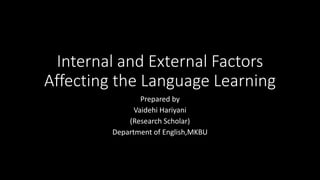
Internal and External factors affecting the Language learning
- 1. Internal and External Factors Affecting the Language Learning Prepared by Vaidehi Hariyani (Research Scholar) Department of English,MKBU
- 2. Outline:- • Some students learn a new language more quickly and easily than others. This simple fact is known by all who have themselves learned a second language or taught those who are using their second language in school. • Clearly, some language learners are successful by virtue of their sheer determination, hard work and persistence. However there are other crucial factors influencing success that are largely beyond the control of the learner. • These factors can be broadly categorized as internal and external. It is their complex interplay that determines the speed and facility with which the new language is learned.
- 3. Internal Factors • Internal factors are those that the individual language learner brings with him or her to the particular learning situation. Native Language Cognition Experience Personality Motivation Age
- 4. Internal Factors • Native language: Students who are learning a second language which is from the same language family as their first language have, in general, a much easier task than those who aren't. So, for example, a Dutch child will learn English more quickly than a Gujarati child. • Cognition: In general, it seems that students with greater cognitive abilities (intelligence) will make the faster progress. Some linguists believe that there is a specific, innate language learning ability that is stronger in some students than in others.
- 5. Internal Factors • Motivation (intrinsic): Intrinsic motivation has been found to correlate strongly with educational achievement. Clearly, students who enjoy language learning and take pride in their progress will do better than those who don't. • Extrinsic motivation is also a significant factor. ESL students, for example, who need to learn English in order to take a place at an American university or to communicate with a new English boy/girlfriend are likely to make greater efforts and thus greater progress.
- 6. • Experiences: Learners who have acquired general knowledge and experience are in a stronger position to develop a new language than those who haven't. The student, for example, who has already lived in 3 different countries and been exposed to various languages and cultures has a stronger base for learning a further language than the student who hasn't had such experiences. • Personality: Introverted or anxious learners usually make slower progress, particularly in the development of oral skills. They are less likely to take advantage of opportunities to speak, or to seek out such opportunities. More outgoing students will not worry about the inevitability of making mistakes. They will take risks, and thus will give themselves much more practice.
- 7. • Age: Second language acquisition is influenced by the age of the learner. Children, who already have solid literacy skills in their own language, seem to be in the best position to acquire a new language efficiently. Motivated, older learners can be very successful too, but usually struggle to achieve native-speaker-equivalent pronunciation and intonation.
- 8. External Factors Curriculum Instruction Culture and Status Motivation (Extrinsic) Access to Native Speakers
- 9. External Factors • Curriculum: For ESL students in particular it is important that the totality of their educational experience is appropriate for their needs. Language learning is less likely to place if students are fully submersed into the mainstream program without any extra assistance or, conversely, not allowed to be part of the mainstream until they have reached a certain level of language proficiency. • Instruction: Clearly, some language teachers are better than others at providing appropriate and effective learning experiences for the students in their classrooms. These students will make faster progress.The same applies to mainstream teachers in second language situations. The science teacher, for example, who is aware that she too is responsible for the students' English language development, and makes certain accommodations, will contribute to their linguistic development.
- 10. • Culture and status: There is some evidence that students in situations where their own culture has a lower status than that of the culture in which they are learning the language make slower progress. • Motivation (extrinsic): Students who are given continuing, appropriate encouragement to learn by their teachers and parents will generally fare better than those who aren't. For example, students from families that place little importance on language learning are likely to progress less quickly.
- 11. • Access to native speakers: The opportunity to interact with native speakers both within and outside of the classroom is a significant advantage. Native speakers are linguistic models and can provide appropriate feedback. Clearly, second-language learners who have no extensive access to native speakers are likely to make slower progress, particularly in the oral/aural aspects of language acquisition.
- 12. Work Cited:- • Lightbown, Patsy M., and Nina Spada. How Languages Are Learned. Oxford: Oxford University Press, 2013. Print. • Macaro, Ernesto. Continuum Companion to Second Language Acquisition. London: Continuum, 2010. Print.
